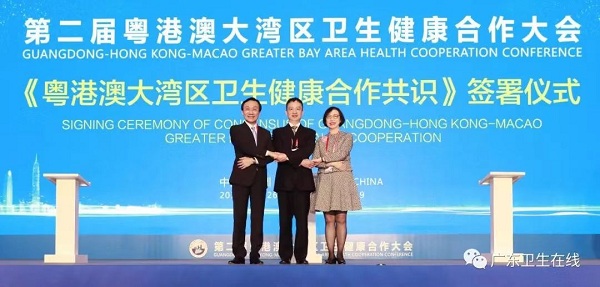Health cooperation agreement signed for Greater Bay Area

A signing ceremony for the Consensus of Guangdong-Hong Kong-Macao Greater Bay Area Health Cooperation was held at the second Guangdong-Hong Kong-Macao Greater Bay Area Health Cooperation Conference in Shenzhen, Guangdong province, Feb 25, 2019.
The consensus to deepen health cooperation and promote the high-quality development of health in the Greater Bay Area was signed by the Health Commission of Guangdong province, the Food and Health Bureau of Hong Kong Special Administrative Region, and the Health Bureau of Macao Special Administrative Region.

Duan Yufei (middle), director of the Health Commission of Guangdong province, Sophia Chan Siu-chee (right), director of the Food and Health Bureau of Hong Kong Special Administrative Region, and Alexis Tam Chon Weng (left), secretary of the Secretariat for Social Affairs and Culture of Macao Special Administrative Region, pose for a photograph at the signing ceremony of a regional health agreement in Shenzhen, Guangdong province, on Feb 25, 2019. [Photo/WeChat account: gdwszx]
With the aim of building the Greater Bay Area into a globally first-class area for healthcare, the agreement strives to establish a quality and efficient health service system in line with international standards by strengthening medical and health cooperation, creating a good policy environment, forming health exchange platforms, and implementing major health projects in the Greater Bay Area. Highlights of the consensus are as follows:
1. Centered on the health of people. Adhering to the "one country, two systems" policy, based on the overall development concept of the Greater Bay Area, health cooperation in Guangdong, Hong Kong and Macao will be strengthened to achieve the sound and quality development of health in the area.
2. Promoting close cooperation of quality medical resources. A good policy environment will be created to encourage Hong Kong and Macao investors entering the healthcare sector in the area. Hong Kong and Macao medical service institutions will be supported to participate in the construction of the medical system in the Greater Bay Area. A specialist alliance will also be built.
3. Strengthening cooperation in the field of public health emergencies. In the light of the Cooperation Agreement on Emergency Mechanism for Public Health Emergencies, the framework of Guangdong-Hong Kong-Macao Joint Conference on the Prevention and Treatment of Infectious Diseases, and the cooperation mechanism for public health emergencies, the liaison mechanism for disasters, health emergencies and medical rescue in the Greater Bay Area will be improved. In addition, joint emergency drills and seminars on infectious diseases prevention and control will be organized regularly.
4. Deepening innovative cooperation in traditional Chinese medicine (TCM). The unique advantages of TCM in healthcare will fully utilized and exchanges and cooperation among Guangdong, Hong Kong and Macao in this field will be supported. Academic discussions, concept promotions and cultural popularization of TCM prevention and treatment of diseases will be conducted. Universities, medical and health institutions and firms will be backed to jointly build laboratories and industrial parks to transform TCM achievements into practical products and mechanisms.
5. Expanding cooperation in the field of scientific research and services. Investors from home and abroad will be supported to invest in the field of biological medicine. Scientific achievements transformation cooperation among medical and health universities, institutions and firms will be encouraged. The integration of medical treatment and healthcare will be promoted to provide healthy, safe and comfortable services for the elderly from Hong Kong and Macao to Guangdong.
6. Reinforcing cooperation among professionals in diagnosis and treatment. In accordance with the model of the national general practitioner and specialists standardized training bases, an international-level training base for key general practitioners and specialists will be established. On-site exchanges in the training projects including epidemiology, occupational health, and tuberculosis prevention and control, will be strengthened. Information connections and experience exchanges in clinical diagnosis and treatment of infectious diseases will be promoted.
MOST POPULAR
- 1 Record trade bodes well globally
- 2 China updates Catalogue of Encouraged Industries for Foreign Investment
- 3 China's commerce ministry to boost consumption, opening-up in 2026
- 4 China's auto production, sales rank first globally for 17th consecutive year
- 5 China remains world's largest online retail market for 13th straight year







